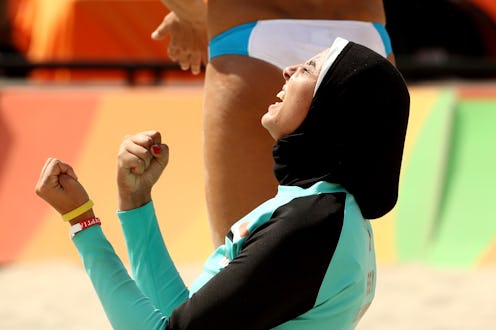News
What Olympian Hijabis Mean To Me As A Muslim Woman
At 13 years old, I had been wearing the hijab for five months. I could finally wrap it in a few different styles without it slipping off my hair, and I had learned how to use hijab pins without poking myself in the head. I had known that when I decided to start wearing the hijab in middle school, I would face a constant struggle. Pre-teens are not kind with their words, and nicknames like “towel-head” and “terrorist” became all too familiar. But I loved my hijab, and I was determined to stay confident and proud of my identity, my religion, and my choice.
With that mentality, I strode into our girls soccer coach’s office one day and asked for the team try out forms. But my enthusiasm was quickly crushed when I heard the coach’s response to my request as she scanned me with judgmental eyes. “You know you will have to wear the uniform when you play though, right?” she said. Nervous from her sharp tone, I tried to explain that I hoped to wear sweatpants and a long sleeved shirt with my hijab instead of the school’s shorts and t-shirt. Her lips thinning in annoyance, she told me my only option if I wanted to keep “that thing” on, was to wear leggings and a tight, longsleeved shirt under the uniform.
For a long time, I convinced myself that I never ended up trying out for the soccer team because I did not want to wear two outfits on top of each other, but the reality was that I felt rejected from the moment I stepped into her office. When I saw the annoyance in her eyes, heard the dislike in her voice, it was easy to tell I was not wanted nor welcome on my school team, that I would only be a bother for her and the other girls. It is difficult to explain the crushing feelings of being unwanted in your own home, your own school, and your own community. It was then that I knew the odds in this country would always be stacked against me as long as I refused to assimilate.
I never tried to join a sports team again after that, but regardless of what clubs I joined or what jobs I had, I always knew that as Muslim woman wearing the hijab, I was obligated to work three times as hard as my peers in order to be considered an equal. That is why it was a very emotional experience for me to watch American fencer Ibtihaj Muhammad and Egyptian volleyball player Doaa El Ghobashy, two powerful, athletic, and hardworking hijabi Muslim women, represent their respective countries in the 2016 Olympics, proving to the world that, against all expectations, they could succeed.
In Ibtihaj Muhammad, I saw a woman who would not have allowed her middle school soccer coach to discourage her from trying out for the team, would not shrink under the piercing stares that followed her, would not back down when insecurities and fear ate away at her from the inside. In the United States, Muslims, especially those who wear the hijab, have been the focus of hatred and anger for decades. Seeing an American woman wearing the very clothing that has made women targets for hate crimes, slurs, and even violence, walk proudly with Team USA in the World Olympics is a loud victory cry. It is justice, it is progress, and it is also a reminder that our battle against bigotry is not over, because it should not be nearly impossible for an American-Muslim woman to get this far. She should not be an exception, but rather a familiar sight.
Comparably, in Doaa El Ghobashy, I saw a woman comfortable in her own skin, who refused to allow herself to be perceived as an “oppressed Middle Eastern woman,” and who finally gave Egyptian women like myself accurate representation. Egypt is a country where the majority of women wear the hijab, yet the media, entertainment, and sports have always failed to convey that. News anchors, actresses, and athletes rarely ever wear the hijab. In fact they often even dye their hair blonde and wear skin lighting cream, making for an extremely inaccurate representation of Egyptian woman and an invalidation of Egyptian features, physiques, and thereby Egyptian identity.
A lot people and media have and will tokenize women like Ibtihaj Muhammad and Doaa Elghobashy for their hijab. Their modest outfits will be the topic of discussions and their religion in headlines for a while, but for girls like me, it is not about the hijab or the outfit; it is about seeing the fruits of determination and persistence. Their capability and success encourage people like me and young girls like my pre-teen sister to continue our journey with pride, confidence, and independence.
Our hijab, our clothes, our religion make up parts of our identities, but they do not define us. We are athletes, academics, writers, poets, activists, and scientists. Unapologetically, we are capable and, finally with role models like Ibtihaj and Doaa to look up to, victorious.
